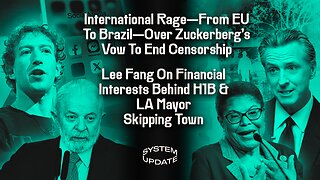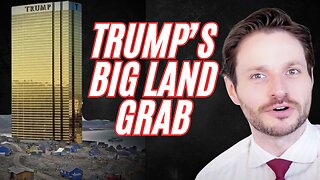Premium Only Content

Today's Crypto Report - Bitcoin REBOUNDS!!!
In a significant move announced today, President Joe Biden has formally blocked Japan's Nippon Steel from acquiring US Steel in a deal valued at $15 billion. The transaction, initially proposed in December 2023, faced stringent scrutiny over potential national security risks, with the President emphasizing the need to safeguard American industries that are critical to the nation's strategic interests.
Biden stated, "It is my solemn responsibility as President to ensure that America has a strong domestically owned and operated steel industry. Blocking foreign ownership of this vital American company is fundamental to our national security and it is a fulfillment of that responsibility."
This executive decision arrives as Biden approaches the end of his term and is expected to have far-reaching implications for both domestic steel production and foreign investment relations. Historically, US Steel has served as a cornerstone of American industrial power, synonymous with the nation's manufacturing prowess. However, the company has struggled in recent years, with declining output and operational capacity amid fierce international competition.
The failure of this acquisition has raised alarm within the steel community. CEO David B. Burritt of US Steel characterized the decision as "shameful and corrupt," arguing that the investment from Nippon Steel, which included plans to inject $3 billion into US Steel's aging facilities, was essential for the firm's survival and growth. Burritt warned that without this foreign backing, US Steel may resort to less profitable operations or consider relocating its headquarters outside of Pittsburgh, jeopardizing jobs and economic stability in the region.
While the United Steelworkers union, representing approximately 850,000 workers in the US steel sector, praised Biden's decision, describing it as a victory for American labor and national security, US Steel and Nippon Steel have expressed intentions to challenge the ruling in court, arguing that no credible evidence supported the claim of a national security threat.
In the political arena, Biden's directive is viewed through the lens of upcoming presidential elections and the broader narrative of economic nationalism. Notably, former President Donald Trump had voiced opposition to the acquisition throughout his 2024 campaign, suggesting that the stark partisan divide over this issue may reverberate in future electoral contests.
The Biden administration's decision has also prompted fears regarding the potential ripple effects on foreign investment in the United States. Analysts suggest that Nippon Steel's investment downturn could deter other foreign companies from pursuing acquisitions, particularly in sensitive industries tied to national security. As highlighted by the lack of a consensus recommendation from the Committee on Foreign Investment in the United States (CFIUS), this episode underscores the growing complexity surrounding foreign investments amid increasing geopolitical tensions.
Market reactions to the news were immediate, with shares of US Steel plunging over 6% following the announcement, reflecting investor apprehension about the company's future without the critical influx of capital from Nippon Steel.
With US Steel situated precariously in a competitive landscape against foreign manufacturers, the implications of Biden's ruling extend beyond the immediate scope of this deal, posing challenging prospects for the resilience and recovery of America's once-mighty steel industry. The global steel production ranks cast Nippon Steel as the fourth largest producer, while US Steel struggles at the twenty-seventh position, exacerbating concerns over domestic capabilities and international competitiveness.
As the situation develops, US Steel and Nippon Steel are expected to explore their legal options while stakeholders grapple with the future dynamics of the American steel sector and its pivotal role in the nation's economic fabric
-
 LIVE
LIVE
The StoneZONE with Roger Stone
1 hour agoUpdate on Andrew & Tristan Tate w/ Lawyer Joe McBride +What will Trump do about J6ers? The StoneZONE
1,652 watching -
 1:30:04
1:30:04
Donald Trump Jr.
7 hours agoFires Rage Across LA, How Dems Destroyed the Golden state, Live with Alex Marlow, John Phillips, and Joe Bastardi | TRIGGERED Ep.206
87.8K151 -
 1:37:52
1:37:52
Glenn Greenwald
5 hours agoInternational Rage—From EU To Brazil—Over Zuckerberg’s Vow To End Censorship; Lee Fang On Financial Interests Behind H1B & LA Mayor Skipping Town | SYSTEM UPDATE #386
37K29 -
 1:11:22
1:11:22
Common Threads
3 hours ago $1.53 earnedLIVE DEBATE: Trump Pushes U.S. Expansion, Cali Fires Spark Political Outrage
14.8K4 -
 54:46
54:46
LFA TV
7 hours agoThe LA Apocalypse | TRUMPET DAILY 1.9.25 7pm
14.5K4 -
 57:50
57:50
theDaily302
12 hours agoThe Daily 302-CORY GAUTEREAUX
9.11K -
 9:49
9:49
Tundra Tactical
2 hours ago $1.24 earnedISIS ATTACK Screams Incompetence.
13.3K2 -
 47:51
47:51
Anthony Pompliano
1 day ago $7.24 earnedRegulators Tried To End Bitcoin?!
51.4K7 -
 LIVE
LIVE
BSparksGaming
7 hours agoMarvel Rivals Season 1 is ALMOST HERE! Time to Grind!
298 watching -
 45:26
45:26
Kimberly Guilfoyle
5 hours agoBreaking News Coverage of LA Fires, Live with Asm Bill Essayli & Jennifer Kelly | Ep. 187
47.3K51
-
 LIVE
LIVE
The StoneZONE with Roger Stone
1 hour agoUpdate on Andrew & Tristan Tate w/ Lawyer Joe McBride +What will Trump do about J6ers? The StoneZONE
1,652 watching -
 1:30:04
1:30:04
Donald Trump Jr.
7 hours agoFires Rage Across LA, How Dems Destroyed the Golden state, Live with Alex Marlow, John Phillips, and Joe Bastardi | TRIGGERED Ep.206
87.8K151 -
 1:37:52
1:37:52
Glenn Greenwald
5 hours agoInternational Rage—From EU To Brazil—Over Zuckerberg’s Vow To End Censorship; Lee Fang On Financial Interests Behind H1B & LA Mayor Skipping Town | SYSTEM UPDATE #386
37K29 -
 1:11:22
1:11:22
Common Threads
3 hours ago $1.53 earnedLIVE DEBATE: Trump Pushes U.S. Expansion, Cali Fires Spark Political Outrage
14.8K4 -
 54:46
54:46
LFA TV
7 hours agoThe LA Apocalypse | TRUMPET DAILY 1.9.25 7pm
14.5K4 -
 57:50
57:50
theDaily302
12 hours agoThe Daily 302-CORY GAUTEREAUX
9.11K -
 9:49
9:49
Tundra Tactical
2 hours ago $1.24 earnedISIS ATTACK Screams Incompetence.
13.3K2 -
 47:51
47:51
Anthony Pompliano
1 day ago $7.24 earnedRegulators Tried To End Bitcoin?!
51.4K7 -
 LIVE
LIVE
BSparksGaming
7 hours agoMarvel Rivals Season 1 is ALMOST HERE! Time to Grind!
298 watching -
 45:26
45:26
Kimberly Guilfoyle
5 hours agoBreaking News Coverage of LA Fires, Live with Asm Bill Essayli & Jennifer Kelly | Ep. 187
47.3K51